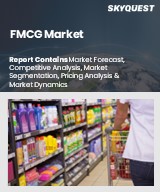
Report ID: SQMIG30D2069
Skyquest Technology's expert advisors have carried out comprehensive research and identified these companies as industry leaders in the FMCG Market. This Analysis is based on comprehensive primary and secondary research on the corporate strategies, financial and operational performance, product portfolio, market share and brand analysis of all the leading FMCG industry players.
The global FMCG industry in 2024 remains highly competitive and dynamic, dominated by multinational giants like Procter & Gamble, Unilever, Nestlé, and PepsiCo. These companies continue to leverage innovation, digital transformation, and strategic partnerships to maintain market leadership.
As per market strategies, Procter & Gamble focuses heavily on sustainability initiatives, investing in biodegradable packaging and carbon-neutral manufacturing to meet rising consumer demand for eco-friendly products.
The FMCG sector is increasingly energized by a wave of innovative startups that are transforming traditional business models. These new entrants focus on leveraging advanced technologies, sustainability, and consumer-focused strategies to meet the growing demand for healthier, eco-friendly, and ethically produced products. By targeting niche segments such as plant-based foods, clean personal care, and sustainable packaging, they appeal to modern consumers who prioritize transparency and social responsibility. Their agile operations, strong digital presence, and direct-to-consumer approaches enable them to scale quickly, and challenge established players in the competitive FMCG market.
REQUEST FOR SAMPLE
Want to customize this report? This report can be personalized according to your needs. Our analysts and industry experts will work directly with you to understand your requirements and provide you with customized data in a short amount of time. We offer $1000 worth of FREE customization at the time of purchase.
Feedback From Our Clients